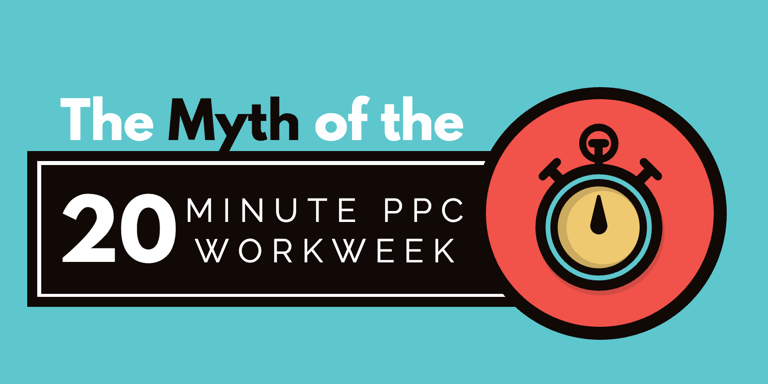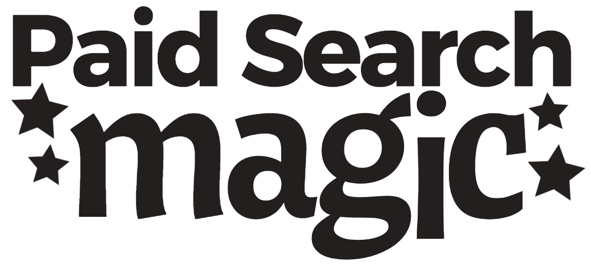
20-minute-ppc-workweek
The first time I saw a tutorial promising a 20-minute workweek for PPC management, I took notes.
Even though I had several years experience running AdWords accounts (in retrospect, I probably had more experience than the guys doing the training), I’m a sucker for a codified instruction guide for paid search.
A typical 20 minute PPC plan (audit, work week, optimization) is basically the High Intensity Interval Training of the PPC world – a quick, effective burst of energy promising better results in less time. In just a few minutes, we’ll restore health to bids and budgets, keywords and campaigns. We’ll even have time to write new ad copy and perform keyword research!
This impressive workflow offers the harried PPC manager some real benefits, including:
- A starting point. Sometimes you just need to take the first step to find your footing and build momentum. Starting with a small, non-ambiguous, accessible process is a great way to simply begin.
- A guided series of steps. No more wheel-spinning as you wonder where to start, where to stop, what to do next, or how much of it to do. Just keep moving through the checklist on your path to success.
- A time limit. Like painting the Golden Gate Bridge, paid search work is never REALLY finished. There’s always another adjustment, optimization, ad extension, or experiment to run. Setting a stopwatch and calling it “done” is a satisfying experience.
- Focus. Not only are you working against the clock, you know exactly what you’re trying to accomplish with each section of the process. Make some quick changes based on key metrics rather than getting lost in a sea of data.
Of course, the actual work of PPC management can’t typically be done in 20 minutes. But that’s not the point, is it?
Tim Ferriss’s 4 hour workweek isn’t really 4 hours.
The 1-Minute Millionaire is not a 60 second path to riches.
Marketers know how to sell us what we want, and give us what we need, and we’re mostly okay with that. We know not to take things too literally.
The dream of a concise, 20-minute management framework is compelling even if we don’t actually believe it’ll deliver, and it’s no surprise that companies use this dream to sell software, generate webinar leads, and boost site traffic.
But that click-bait comes at a cost.
Managers, clients, and bosses see those headlines too.
The folks who don’t have time to learn paid search – but do have time to read hyped up headlines – are especially skilled at finding these articles and infographics. What happens when the overt promises of the 20 minute workweek are planted – Inception-like– into the mind of the person who signs your paycheck?
Not good things.
It’s a lovely idea that a full time job can be reduced to few hours a week with the right processes and hacks, but it’s dangerous to expect it of your team.
Problem 1: It conflates analysis with execution
Confession: I’ve fallen into this trap as well.
I’ve been the jerk who conflated time needed to analyze with time needed to implement, and had an unrealistic idea of how long account work should take.
A contractor had billed us for a few hours of bid optimizations, but when I downloaded the change history (the client required a weekly export of all account changes), I could count his bid changes on two hands.
I asked the contractor for an explanation, and he informed me that he didn’t spend hours making changes, but hours figuring out what needed to be changed.
He was right.
I was wrong.
And worse than just being wrong, I had essentially called into question his competency and/or integrity, which put a strain on the level of trust in our working relationship.
Maybe you’ve heard this one: A man has a successful operation in which a screw is used to repair his broken hip. He is outraged by the bill, and demands an itemized list of the charges. The doctor sends his response:
- Screw: $5
- Knowing where to put the screw: $9,995
The story may be an urban legend, but the message holds up. This commentary is found on snopes.com of all places – so it’s gotta be true:
What is the value of a task? As this legend points out, performing the actual labor can easily be the smallest part of the process, with the real value lying in correctly diagnosing the problem and coming up with a viable solution to it.
Diagnosing anything but the most obvious problem (“someone set this thing to evil!”) is a time-consuming, labor-intensive effort. One we’d rather avoid and not pay for, but good luck finding a mechanic who can tell you what’s causing that rattling sound without opening the hood.

Problem 2: Follow this timeline, and you’ll miss the good stuff
You can’t make meaningful keyword optimizations in 1 – 2 minutes.
You can make some changes, sure.
You’ll probably hit the highs and lows.
But you miss the long tail. You miss the delicious middle that holds the crazy search terms that sneak past the “top 10” lists but seriously affect your account. You miss the modifiers that cling like barnacles to your Good Ship AdWords, slowly accumulating spend but never driving sales.
Depending on your account size, you may miss expansion opportunities where low-volume, relevant keywords just need a bid boost or more specific ad copy to get traction.
To return to the challenge of time-bound promises, you can choose to exercise for 5 minutes a day – that may even be a huge improvement. But if your goal is to make real changes to your health or fitness level, you’ll never see great results with minimal effort.
Focussing on the low-hanging fruit is the right move when you’re pressed for time, but if that’s all you do, you miss all the other good fruit that doesn’t happen to be within easy reach.
Problem 3: It’s a map with no map
The third danger of placing your bets on a 20 minute optimization plan is closely related to the second, since they’re both related to how much ground you can cover with not enough time.
Problem 2 is a shortcoming of an insufficient time limit that does not allow for sufficient exploration and discovery. Problem 3 is a shortcoming of the advice offered in these posts themselves.
Anything can be reduced to steps, even if the steps are non-sensical or can’t be followed. Watch:
How to win the lottery (every time!) in 3 steps
- Buy a ticket with the right series of numbers
- Check your numbers against the winning numbers
- Cash in your ticket and celebrate
You’ve probably seen articles of similar merit on wikihow or getanswers.
The no-duh conclusion
Using processes, frameworks, and even time limits to structure your paid search workflow can be very good. Personally, I’m a huge fan of the 80/20 rule, and I love eliminating low-value, time-consuming work. I’m guessing you do too.
But it behooves all of us to know what’s a realistic output and what’s simply a sexy headline.
Meaningful account adjustments take skill and time. I hope you’re comfortable with that, and I hope you’re surrounded by a team that respects it, too.
But let’s be honest: if you’re reading this article, it’s probably because you’re seeking validation. You may even have people specifically questioning your productivity based on their unrealistic expectations of how long things take.
If that’s the case, gentle reader, you have my sympathy. I hope you can use the objections mentioned here to make a case for why you need time to… you know, do your full-time job. It’s easy to want things to take less time and effort, but the time and effort are necessary to achieve magic in your accounts.
If you’re ready to uplevel your AdWords skills, check out Amy’s PPC Coaching program here.
If you feel the same way, join us here. You'll get our latest content and podcast episodes that will teach, inspire, and motivate you to achieve new levels of success with Paid Search. Success! You're in. You'll get our latest stuff soon. Here at Paid Search Magic, we get pretty excited about all things related to getting better RESULTS in Paid Search Marketing.

PS: If you’ve made it to the end of this article and you’re like “I’ve never heard of a 20 minute workweek for PPC before, but it sounds awesome – I want more structure in my management”: that so wasn’t my point, but I get it, really. Us PPCers crave structure. Here’s a great article from Joanna Wiebe over on Copyhackers that has it all: Time management, scheduling, quadrants, tracking, delegation, habits, and more. Go read that, not some crappy post that suggests you can create an effective ad copy experiment in 1 minute, but stops short of giving you any guidance how you’d actually do that.
